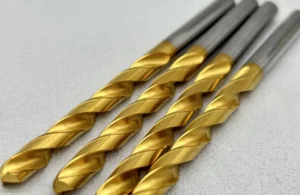When it comes to drilling through tough materials like metal or hardwood, having the right tool for the job can make all the difference. High-Speed Steel (HSS) drills stand out as a popular choice among craftsmen and professionals due to their unique properties and performance. In this article, we’ll explore how HSS drills compare to other types of drill bits, highlighting their advantages and limitations.
Table of Contents
ToggleIntroduction to HSS Drill Bits
High-Speed Steel (HSS) drills are renowned for their durability, versatility, and efficiency in various drilling applications. Unlike conventional carbon steel drills, HSS drills are composed of a special alloy that includes elements like tungsten, chromium, and vanadium, enhancing their hardness and heat resistance. This superior material composition allows HSS drills to maintain their sharpness and cutting ability even at high speeds and temperatures.
Comparing HSS Drills with Carbon Steel Drills
One of the most significant differences between HSS drills and carbon steel drills lies in their composition. While carbon steel drills are more affordable, they tend to dull quickly when drilling through hard materials like metal or hardwood. In contrast, HSS drills excel in such applications, thanks to their enhanced hardness and heat resistance. This means that HSS drills can maintain their cutting edge for longer periods, resulting in smoother and more precise drilling operations.
Advantages of HSS Drills Over Cobalt Drills
Cobalt drills, another popular alternative to HSS drills, are known for their exceptional hardness and wear resistance. However, despite their impressive performance in certain applications, cobalt drills can be brittle and prone to chipping when subjected to excessive force or vibration. In comparison, HSS drills strike a balance between hardness and toughness, making them more resilient and less susceptible to damage during drilling. Additionally, HSS drills offer better value for money, as they are generally more affordable than cobalt drills while still delivering excellent performance.
HSS Drills vs. Titanium Coated Drills
Titanium coated drills, often marketed for their enhanced surface hardness and friction reduction, are commonly used in DIY and light-duty drilling tasks. While titanium coatings can improve the wear resistance of drill bits and reduce friction during drilling, they do not alter the fundamental properties of the underlying drill material. In contrast, HSS drills provide consistent performance across a wide range of materials and applications, making them a preferred choice for professionals and enthusiasts alike.
The Superiority of HSS Drills
In summary, High-Speed Steel (HSS) drills offer a winning combination of durability, versatility, and cost-effectiveness compared to other types of drill bits. Their unique alloy composition enables them to withstand high-speed drilling, resist heat buildup, and maintain sharpness for prolonged periods. Whether you’re drilling through metal, wood, or plastic, HSS drills deliver reliable performance and exceptional results. So, next time you reach for a drill bit, remember the unmatched capabilities of HSS drills in tackling challenging drilling tasks.
